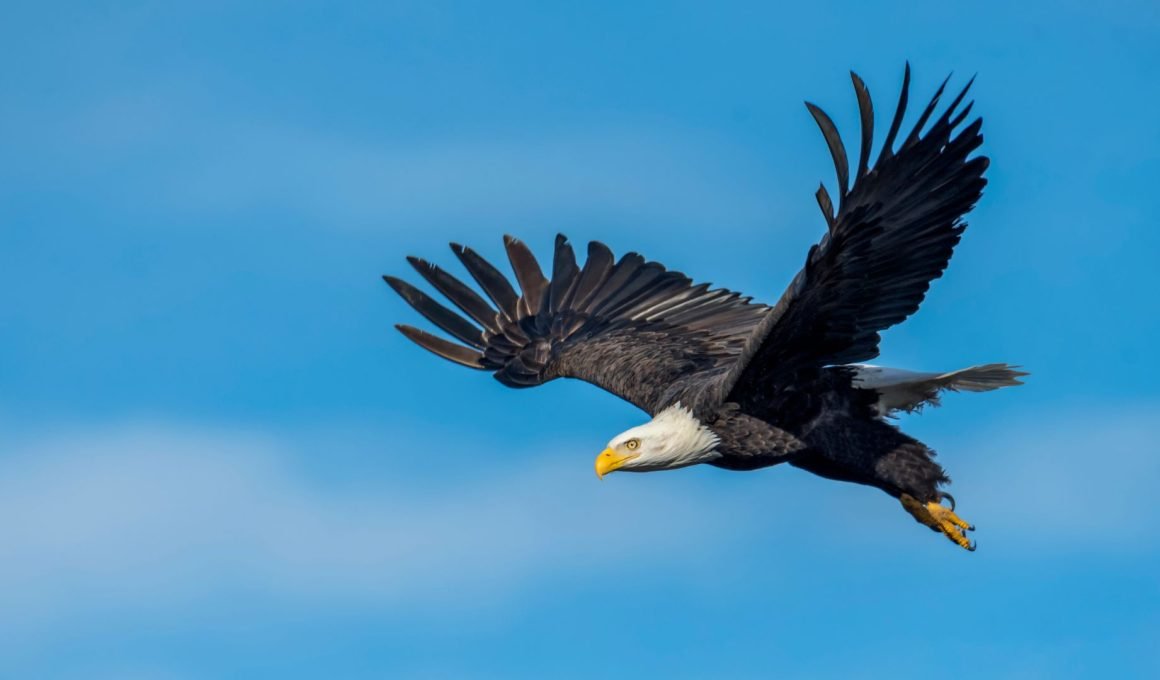Eagles hold a prominent symbolic presence throughout the Bible, representing various attributes and qualities that hold spiritual significance.
From the Old Testament to the New Testament, the majestic eagle is used metaphorically to convey profound lessons and insights.
Let’s explore the symbolic meanings associated with eagles in biblical contexts:
Characteristics of an Eagle in the Bible
In the Bible, the eagle is frequently cited as a symbol of strength and courage, often highlighting its ability to soar to great heights and its keen vision. It serves as a metaphor for God’s protection and care over His people, emphasizing qualities such as resilience, power, and a sharp awareness of its surroundings.
Here are 11 characteristics of an eagle in the bible.
1. Soaring Heights
Eagles are renowned for their ability to soar to great heights with keen eyesight. This attribute is often used metaphorically to depict spiritual elevation and perspective.
Isaiah 40:31 (NIV): “But those who hope in the Lord will renew their strength. They will soar on wings like eagles; they will run and not grow weary, they will walk and not be faint.”
This verse highlights the spiritual renewal and strength that comes from placing one’s trust in God, likening believers to eagles who rise above challenges and soar in faith. The image of soaring on eagle’s wings symbolizes the empowerment and freedom that faith in God provides, enabling believers to transcend earthly limitations and find renewed vigor in their spiritual journey.
2. Vision and Discernment
The eagle’s keen eyesight symbolizes spiritual vision and discernment. It represents the ability to see clearly and perceive things from a higher perspective, beyond mere physical sight.
Proverbs 30:17 (NIV): “The eye that mocks a father, that scorns an aged mother, will be pecked out by the ravens of the valley, will be eaten by the vultures.”
Here, the eagle’s vision is metaphorically used to depict the consequences of disrespect and arrogance. The imagery underscores the importance of wise discernment and respectful behavior, as those who fail to show honor and reverence are likened to prey vulnerable to the swift judgment symbolized by the eagle’s keen gaze.
This metaphorical use of the eagle’s vision encourages humility and deep respect for authority and wisdom, reflecting God’s desire for His people to see clearly and discern wisely in their interactions and decisions.
3. Strength and Power
Eagles are known for their strength and power, which symbolically represent God’s might and sovereignty.
Psalm 103:5 (NIV): “[The Lord] satisfies your desires with good things so that your youth is renewed like the eagle’s.”
This verse illustrates how God renews and strengthens His people, likening the process to the eagle’s ability to renew its strength and vitality.
The eagle’s strength is a symbol of God’s unfailing power and provision, ensuring that those who trust in Him will find their vigor and resilience replenished like the eagle soaring effortlessly through the skies. It underscores the assurance that God’s strength is more than sufficient for any challenge or trial, enabling His people to face adversity with steadfast confidence and unwavering faith.
4. Protection and Refuge
Eagles are also seen as providers of protection and refuge, shielding their young from harm and danger.
Deuteronomy 32:11 (NIV): “Like an eagle that stirs up its nest and hovers over its young, that spreads its wings to catch them and carries them aloft.”
This passage portrays God’s protective care for His people, likening His watchful presence to that of an eagle guarding its young. The eagle’s role as a protector symbolizes God’s unfailing commitment to shield His children from harm and provide a safe refuge amidst life’s storms.
It highlights His nurturing love and vigilant guardianship, ensuring that those who abide under His wings find safety and security in His embrace. Just as the eagle spreads its wings to shield its offspring, God extends His divine protection over His people, offering them comfort and assurance in times of vulnerability and uncertainty.
5. Swiftness and Agility
Eagles are swift and agile in flight, symbolizing God’s responsiveness and quick intervention.
Jeremiah 49:22 (NIV): “Behold, he shall come up and fly like the eagle, and spread his wings over Bozrah: and at that day shall the heart of the mighty men of Edom be as the heart of a woman in her pangs.”
This verse depicts the swift judgment and intervention of God, likening it to the eagle swiftly moving to execute His purposes. The eagle’s agility symbolizes God’s decisive action and swift justice, emphasizing His ability to swiftly fulfill His promises and execute His plans.
It underscores the certainty that God’s timing is impeccable, and His interventions are swift and effective, ensuring that His purposes are accomplished without delay. This symbolism encourages believers to trust in God’s timely intervention and to rely on His swift responses to their prayers and petitions, knowing that He acts with precision and purpose in all circumstances.
6. Longevity and Renewal
Eagles are known for their long lifespan and ability to renew their strength as they age, symbolizing spiritual endurance and resilience.
Psalm 103:5 (NIV): “[The Lord] satisfies your desires with good things so that your youth is renewed like the eagle’s.”
This reaffirms the theme of God’s renewal and rejuvenation of His people, akin to the eagle’s ability to renew its vitality. The eagle’s longevity symbolizes God’s enduring faithfulness and the timeless nature of His promises.
It illustrates His ability to sustain His people through every season of life, ensuring that those who wait upon Him find their strength renewed like the eagle soaring high above the challenges of life. It encourages believers to persevere with unwavering hope, knowing that God’s renewing power enables them to rise above adversity and experience continual spiritual growth and vitality.
7. Perseverance and Endurance
Eagles endure through storms and adversity, symbolizing the perseverance and endurance required in the Christian faith.
Isaiah 40:31 (NIV): “But those who hope in the Lord will renew their strength. They will soar on wings like eagles; they will run and not grow weary, they will walk and not be faint.”
This verse underscores the importance of relying on God’s strength to endure trials and challenges, akin to the eagle’s ability to soar above turbulent conditions.
The eagle’s resilience symbolizes God’s provision of steadfast endurance and unwavering perseverance, ensuring that those who trust in Him can overcome obstacles and emerge victorious.
It encourages believers to lean on God’s sustaining grace and to draw strength from His promises, knowing that He equips them with the resilience needed to navigate life’s difficulties with steadfast faith and unwavering courage.
8. Spiritual Awakening and Revival
Eagles are often associated with spiritual awakening and revival, signifying a renewed passion and zeal for God’s purposes.
Habakkuk 1:8 (NIV): “Their horses are swifter than leopards, fiercer than wolves at dusk. Their cavalry gallops headlong; their horsemen come from afar. They fly like an eagle swooping to devour.”
This imagery portrays eagles as swift agents of judgment and revival, emphasizing the urgency and intensity of spiritual awakening. The eagle’s swift flight symbolizes God’s awakening call to His people, urging them to respond with fervent devotion and renewed commitment.
It underscores the transformative power of God’s Spirit in igniting a revival of faith and passion for His kingdom’s purposes. This symbolism inspires believers to embrace God’s call to spiritual renewal and to pursue a fervent pursuit of His presence, knowing that He desires to awaken hearts and ignite a revival that transforms lives and communities.
9. Majesty and Nobility
Eagles embody majesty and nobility, symbolizing the lofty stature and exalted nature of God.
Revelation 4:7 (NIV): “The first living creature was like a lion, the second was like an ox, the third had a face like a man, the fourth was like a flying eagle.”
In this apocalyptic vision, the eagle represents divine majesty and authority, reflecting the awe-inspiring presence of God. The eagle’s majestic flight symbolizes God’s sovereign rule and His exalted position above all creation. It portrays His divine attributes of power, glory, and transcendence, highlighting His unmatched greatness and majesty.
This imagery inspires reverence and adoration for God’s divine nature and encourages believers to worship Him with awe and reverence, acknowledging His sovereign authority over all aspects of life and creation.
10. Divine Guidance and Providence
Eagles are seen as symbols of divine guidance and providence, leading believers through life’s journey.
Exodus 19:4 (NIV): “You yourselves have seen what I did to Egypt, and how I carried you on eagles’ wings and brought you to myself.”
This verse portrays God’s guidance and deliverance of His people, likening it to the eagle’s care for its young, guiding them to safety. The eagle’s role as a guide symbolizes God’s faithful leadership and His commitment to leading His people through every season of life. It illustrates His loving provision and unwavering presence, ensuring that those who trust in Him find their paths directed and their steps guided by His divine wisdom.
Just as the eagle carries its young on its wings, God extends His divine guidance and providential care, guiding His people with tender compassion and steadfast faithfulness.
This symbolism encourages believers to entrust their lives to God’s guiding hand and to follow His leading with confidence, knowing that He navigates their journey with perfect wisdom and loving care.
11. Freedom and Independence
Eagles symbolize freedom and independence, reflecting the liberty found in Christ.
Galatians 5:1 (NIV): “It is for freedom that Christ has set us free. Stand firm, then, and do not let yourselves be burdened again by a yoke of slavery.”
This verse encourages believers to embrace the freedom found in Christ, akin to the eagle’s ability to soar freely in the skies. The eagle’s flight symbolizes the spiritual liberty and emancipation that Christ provides, liberating believers from the bondage of sin and empowering them to live in freedom.
It underscores the privilege of being children of God, called to walk in the freedom of His grace and truth. This symbolism inspires believers to live boldly and confidently in their identity as redeemed sons and daughters of God, enjoying the spiritual liberty that enables them to fulfill God’s purposes and glorify Him in every aspect of their lives.
Conclusion
Eagles in the Bible symbolize a range of spiritual truths and qualities, offering profound insights into God’s character and His relationship with His people.
From soaring heights to divine guidance, the eagle serves as a powerful metaphor that encourages believers to trust in God’s strength, persevere through challenges, and embrace the spiritual freedom and majesty found in Christ.







